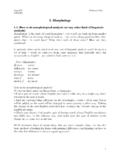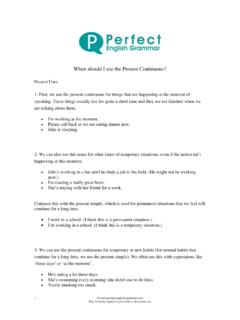Present Tense Regular Re Verbs
Found 4 free book(s)Differences between British and American English
www.enago.com18. The past tense and past participle of the verbs learn, spoil, spell (only in the word-related sense), burn, dream, smell, spill, leap, and others, can be either irregular (learnt, spoilt, etc.) or regular (learned, spoiled, etc.). In British English, both irregular and regular forms are used, but the irregular forms tend to be used more often.
1.1. How to do morphological analysis (or any other kind ...
people.umass.eduVerbs 3rd person singular present -s, -es: it rains, Karen writes, the water sloshes past tense -ed: paint/painted . perfect aspect -ed: paint/painted ('has painted) (past participle) . progressive or continuous aspect -ing: fall/falling, write/writing (present participle) Adjectives comparative (comparing two items)
When should I use the Present Continuous?
www.perfect-english-grammar.com4: Another present continuous use is for habits that are not regular, but that happen very often. In this case we usually use an adverb like 'always', 'forever' or 'constantly'. Often, we use the present continuous in this way to talk about an annoying habit. You're forever losing your keys! She's constantly missing the train.
Georgia Standards of Excellence (GSE)
www.georgiastandards.orgJan 08, 2016 · Begin to distinguish shades of meaning among verbs describing the same general action (e.g., walk, march, strut, prance) by acting out the meanings. ELAGSEKL6: Use words and phrases acquired through conversations, reading and being read to, and responding to texts.



